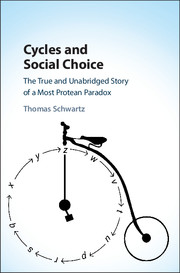Book contents
- Cycles and Social Choice
- Cycles and Social Choice
- Copyright page
- Dedication
- Contents
- Acknowledgements
- Introduction
- 1 Condorcet’s Two Discoveries
- 2 Incidence of the Paradox
- 3 Social Rationality
- 4 Arrovian Cycle Theorems
- 5 Second Line of Cycle Theorems: Condorcet Generalizations
- 6 Top Cycles in a Fixed Feasible Set
- 7 Strategic Consequences of Cycles
- 8 Structural Consequences of Cycles
- 9 Questions about Prediction and Explanation
- 10 Questions about Prescription and Evaluation
- Concluding Caveats
- Underbook: Background and Sources by Chapter
- References
- Index
10 - Questions about Prescription and Evaluation
Published online by Cambridge University Press: 09 March 2018
- Cycles and Social Choice
- Cycles and Social Choice
- Copyright page
- Dedication
- Contents
- Acknowledgements
- Introduction
- 1 Condorcet’s Two Discoveries
- 2 Incidence of the Paradox
- 3 Social Rationality
- 4 Arrovian Cycle Theorems
- 5 Second Line of Cycle Theorems: Condorcet Generalizations
- 6 Top Cycles in a Fixed Feasible Set
- 7 Strategic Consequences of Cycles
- 8 Structural Consequences of Cycles
- 9 Questions about Prediction and Explanation
- 10 Questions about Prescription and Evaluation
- Concluding Caveats
- Underbook: Background and Sources by Chapter
- References
- Index
Summary
- Type
- Chapter
- Information
- Cycles and Social ChoiceThe True and Unabridged Story of a Most Protean Paradox, pp. 122 - 139Publisher: Cambridge University PressPrint publication year: 2018



